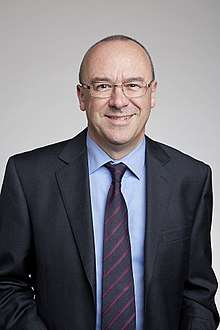Christopher Bishop
Christopher Michael Bishop (born 7 April 1959)[1] FRS FRSE FREng[5] is the Laboratory Director at Microsoft Research Cambridge, Professor of Computer Science at the University of Edinburgh and a Fellow of Darwin College, Cambridge.[6]
Chris Bishop | |
|---|---|
 Chris Bishop in 2015 | |
| Born | Christopher Michael Bishop 7 April 1959[1] |
| Alma mater |
|
| Known for | Pattern Recognition and Machine Learning (PRML) book |
| Awards |
|
| Scientific career | |
| Fields | Machine learning[3] |
| Institutions | |
| Thesis | The semi-classical technique in field theory: some applications (1983) |
| Doctoral advisor | David Wallace[4] |
| Doctoral students | Danielle Belgrave |
| Website | research |
Education
Bishop obtained a Bachelor of Arts degree in Physics from St Catherine's College, Oxford, and a PhD in Theoretical Physics from the University of Edinburgh, with a thesis on quantum field theory supervised by David Wallace.[1][4]
Research and career
Bishop's research investigates machine learning[5] by allowing computers to learn from data and experience.[6][7][8] His doctoral students include Neil Lawrence.[9][10]
Awards and honours

Bishop was awarded the Tam Dalyell prize in 2009[11] and the Rooke Medal from the Royal Academy of Engineering in 2011.[12] He gave the Royal Institution Christmas Lectures in 2008[2] and the Turing Lecture in 2010. Bishop was elected a Fellow of the Royal Academy of Engineering (FREng) in 2004,[13] a Fellow of the Royal Society of Edinburgh (FRSE) in 2007,[14] and Fellow of the Royal Society (FRS) in 2017.[5]
References
- Anon (2015). "BISHOP, Prof. Christopher Michael". Who's Who. ukwhoswho.com (online Oxford University Press ed.). A & C Black, an imprint of Bloomsbury Publishing plc. doi:10.1093/ww/9780199540884.013.249776. (subscription or UK public library membership required) (subscription required)
- 2008 Royal Institution Christmas Lectures
- Christopher Bishop publications indexed by Google Scholar

- Bishop, Christopher Michael (1983). The semi-classical technique in field theory : some applications (PhD thesis). University of Edinburgh. hdl:1842/11984. OCLC 59284998. EThOS uk.bl.ethos.346542.

- Anon (2017). "Christopher Bishop". royalsociety.org. London: Royal Society.
- "Microsoft Research Cambridge".
- Bishop, Christopher Michael (1995). Neural Networks for Pattern Recognition. Oxford University Press. ISBN 9780198538646.
- Tipping, Michael E.; Bishop, Christopher M. (1999). "Probabilistic Principal Component Analysis". Journal of the Royal Statistical Society, Series B. 61 (3): 611–622. CiteSeerX 10.1.1.35.2022. doi:10.1111/1467-9868.00196. ISSN 1369-7412.
- Lawrence, Neil (2001). Variational inference in probabilistic models (PhD thesis). University of Cambridge.
- Christopher Bishop at the Mathematics Genealogy Project
- Tam Dalyell Prize
- Royal Academy of Engineering, Rooke Medal
- "Royal Academy of Engineering". Retrieved 1 February 2018.
- "Professor Christopher M Bishop FREng FRSE, FRS - The Royal Society of Edinburgh". The Royal Society of Edinburgh. Retrieved 1 February 2018.